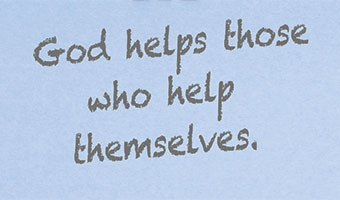Solomon is reported to have composed 3,000 of them (1 Kings 4:32). Daily we see them on Instagram posts, coffee cups, bumper stickers, tweets and T-shirts. Ninety years ago one of the first national advertising campaigns capitalized on their humorous appeal while promoting a shaving product:
“Hardly a driver / Is now alive / Who passed / On hills / At 75 / Burma-Shave” (1939).
What exactly has captured our attention for all these years? The answer is proverbs, adages or maxims.
It seems one of the main reasons we are attracted to these sayings is they usually convey an element of truth. For example, most of us have heard or said, “Confession is good for the soul.” In just six words there is the encouragement to unload one’s burdens related to acts of omission or commission.
This saying probably has its roots in James 5:16: “Therefore confess your sins to one another, and pray for one another, so that you may be healed. The prayer of the righteous is powerful and effective.” A proverb has an economy or efficiency of words to it.
Adages also help us simplify the complexity of life. As we struggle to comprehend things that don’t always make sense, we are looking for shortcuts to assist our thinking and speaking. Harold B. Lee, a former president of The Church of Jesus Christ of Latter-day Saints, wrote: “Life is fragile, handle with prayer.” Once again just six words draw a picture for us in terms of dealing with the chances of life. Or another way to say it would be to quote Forrest Gump: “My momma always said life was like a box of chocolates.”
Many proverbs bring a smile to our face or lighten our mood in some way. Proverbs passed down from generation to generation develop an aura of authority to them, such as “the pen is mightier than the sword.” While there aren’t too many pen users anymore, they probably still outnumber bearers of swords. But the point of this saying is that there is a power of the word or persuasion that is greater than brute force.
Some adages need to be understood like the proverbial glass of water — are they half empty or half full? In other words, there is an element of truth, but in the end the point or conclusion that the saying makes is short on truth. Adages in this category usually have something to do with God’s providence and grace. Perhaps they should come with a label reading: “Warning — Half Empty.”
Some adages are scientifically incorrect and yet speak a deeper truth, for example “a watched pot never boils.” One can’t actually stop a pot from boiling by obsessively watching it, but nevertheless this saying does tell a truth that if one is waiting for something to take place it often seems not to happen in the allotted time frame.
So if you find yourself surrounded by people who are fond of using adages, my advice is: “When in Rome do as the Romans.”
– Ronald T. Glusenkamp
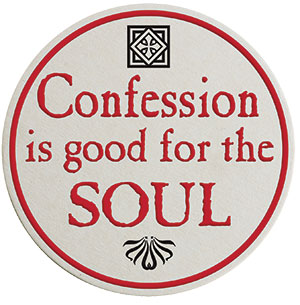
Confession is good for the soul
This proverb found in a 1721 James Kelly publication, A Complete Collection of Scottish Proverbs, started out as “Open confession is good for the soul.” Somewhere along the way we abandoned the “open” part.
Who made that decision? Maybe it was discovered that closed confession was just as delicious to the soul and, so as not to confuse things, they just settled on all flavors of confession as good soul food.
As people of faith we often associate confession with the admission of sins. The Merriam-Webster dictionary defines confession in two ways as it relates to religion: a disclosure of one’s sins in the rite of reconciliation, and a formal statement of religious beliefs.
Likewise, the Bible speaks of confession in the same two ways. So if the Bible speaks of two types of confession, exactly which is good, better or best for the soul? If I had to choose I’d likely go with the latter, not because I’m sinless and therefore don’t need to confess but because I believe the act on the cross covered all of my sins — 2,000 years before I even committed them. I can’t compete with that. But I can confess that it’s my faith in Jesus Christ that saved my sin-sick soul.
So confession is indeed good for the soul, not to feed our need to assuage our guilt but to proclaim the goodness of Jesus Christ as our Lord and Savior, who lived and died and lived again for the atonement of our sins — past, present and future. Now that’s what I call good soul food.
– Ulysses Burley
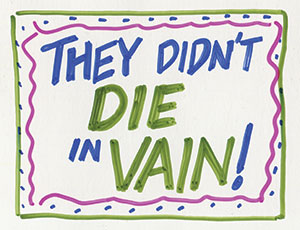
They didn’t die in vain
From community vigils where we gather to pray and grieve when someone has been murdered, to charity runs inspired by cancer victims, to nations directing military policy spurred by the deaths of heroes, my stomach churns when someone urges us to act in the memory of our beloved dead so they will not have “died in vain.”
I share the grief that urges survivors to more and better works of service. Parents never want another child to suffer in the way theirs did from cancer. Soldiers want to fight on so their comrades’ sacrifice is not in vain. We hate the suffering and death that has come to our neighbors and nation. We must do something to redeem their deaths from meaninglessness.
I’ve also come to understand that nothing I do — or all of us do together — will ever be able to make good the deaths of our beloved. Grieved parents can work for the rest of their lives to end cancer, but they know that not all the work in the world will equal the life of their dear child. An entire town can mobilize to prevent more murders, but we know the dead are dead.
Yet let us cling to God in Jesus Christ, who is victorious over sin and death. No work but God’s can redeem our beloved’s death. Instead of vain attempts to make right the senselessness of sin and death, in Christ our works become praise for the one who truly brings life out of death. “Therefore, my beloved, be steadfast, immovable, always excelling in the work of the Lord, because you know that in the Lord your labor is not in vain” (1 Corinthians 15:58).
– Michael Wilker

istock/BIZOO_N
Part of God’s plan
When someone experiences a loss or crisis, perhaps no religious platitude is uttered more often than some variation of “This is part of God’s plan.” It usually comes from a human desire to believe that, despite the pain and feeling that life is spinning out of control, God is totally in charge — but in ways no one can really understand or explain. But saying it usually doesn’t help.
A sad consequence of this thinking is that it ultimately lifts up a picture of an omnipotent God who is arbitrary and often cruel. Somehow the experience of losing someone in a car accident, a serious illness or any one of thousands of other sad scenarios is just part of God acting as grand puppeteer and manipulating the world. Although no one can tell us what the final good will be, we are supposed to receive consolation knowing that our misfortune is really a good thing.
Contrast that with the God we meet in Jesus. Rather than manipulating our circumstances to accomplish some nebulous plan, the God we meet in Jesus enters into our circumstances (even the out of control ones). This God suffers with us and for us to bring us life, even in the face of death itself. Scripture tells us: “My grace is sufficient for you, for power is made perfect in weakness” (2 Corinthians 12:9).
Some may encourage us to cling to a God who is in charge even when it feels like life is out of control. But the God we meet in Jesus offers persistent and costly love, present with us in all things and suffering with us and even on our behalf.
– David D. Daubert

There but for God’s grace go I
Really? Do I actually have more grace than the next person?
I’ve mostly heard this phrase used to refer to someone in a situation that is “less” — less money, less health, less status, less dignity and so on. Having spent many years doing mission trips where I worked with people living in poverty and varying degrees of wellness, and becoming more aware of my state of health and poverty and “whiteness,” I wrestle over and over again with questions of “Who is really well?” “Who is actually living in a state of poverty?” “What gives me the right to think that I either receive or deserve more grace than anyone else?”
Does this phrase elicit pity for someone else? Or, almost worse, gratitude for my elevated place of grace for no real reason other than where I was born and the family and people surrounding me in my lifetime? Either way it sounds like making God into a God who grants grace to some and not to others.
One of the important statements that has guided my life over the last few years comes from an aboriginal woman from the 1900s who said, “If you have come to help me, you are wasting your time. But if your liberation is bound up with mine, then let’s work together.”
It’s our common need to be well, our common purpose to help each other, and our common state of grace that is the basis for the transformative work we do together. One-sided charity just won’t cut it. Simply writing a check won’t change us. Living in a privileged way won’t call us into the “we” that God intends.
For the past 10 years our congregation has been trying to “change our face,” embracing the diversity of race, culture, economic status, sexual orientation, gender, age and individual spiritual reality. While it’s a slow process based on creating a relationship fully broken and fully whole, we now live in a constant state of asking our mission question: “Does love live here?” And if it does, can we eliminate the need to determine who is deserving of or who receives God’s grace in an all-embracing welcome?
– Christine A. Berthelsen
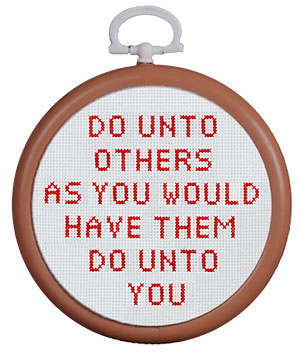
Do unto others as you would have them do unto you
We’ve all heard it plenty of times. It’s a fast quip, giving us a wealth of ethical material packed into one line. No wonder it has achieved golden status. Maybe we should even think of a platinum promotion for this adage. But before we do that, let’s stop and think about how we even got this golden rule.
The idea of doing unto others isn’t new. Wisdom literature across all religious traditions has some version of the rule. One popular understanding seems to have been the silver version, kind of “don’t do to others what you yourself don’t want done to you.” Jesus also expanded on this principle, once in Matthew 7 and again in Luke 6. This is where the more familiar “Do to others” comes from.
As we’ve seen this adage expand over time, I would like to propose another expansion: “Do unto others as they want done unto them.” Perhaps we should be asking the people we engage with how they would like to be treated and go from there.But no matter how this adage is changed, it will remain the golden rule for a reason. For it asks us to think of how we are treating other people. It compels us to place ourselves in their shoes and gain understanding before we act.
– Amanda (Amy) Diller

istock/TWOHUMANS
God must have needed another angel
I don’t understand. Are these words of comfort? Really? So what you’re saying is that God couldn’t handle being God so God had to recruit a little help? And my son was just the right person for the job so God took him from me? Sorry, but I’ve got some big problems with that.
“God must have needed another angel” would be on my top 10 list of things not to say to a grieving parent. When my son, Max, died more than two years ago, my family experienced all kinds of responses. The majority of them have been beautiful and have carried us through the darkest times. But occasionally someone will throw us a zinger. This statement is one of them. Yes, the Bible speaks of angels, but not in the way this statement infers. Angels were and are messengers of God, extensions of the Spirit if you will, rather than repurposed people.
I’m in the deepest pain that a parent could ever experience. There really isn’t anything you can say that will make that pain go away. I know you love me and want my pain gone. But don’t try. No, really, don’t try to take my pain away — live in it with me. You don’t need to say anything. Just be with me in my grief instead of trying to use words to cheer me up. Being is better than words.
However, do I believe Max had angelic qualities? Absolutely. Does God’s Spirit remind me regularly that Max is always with me? You bet. Is Max resurrected with Christ? A resounding yes.
– Tom Schwolert

istock/EMARTO
Let go and let God
As a piece of popular theology, “Let go and let God” is trite and profound, hurtful and helpful.
It’s hurtful when served with a side of “get over it already” or “you just have to trust.” The thinly veiled accompanying message might be “You are taking too long to grieve” or “If your faith was stronger you wouldn’t worry — consider the lilies of the field” (Matthew 6:25–29).
It’s trite when the perceived meaning reduces God to a Magic 8 Ball® decision-maker (“It is certain”) or absolves personal responsibility (“God’s work, not mine”).
Mary Lynn Hendrickson, a director of faith formation in Stoughton, Wis., wrote: “For people who are in recovery — who have been to hell and back — and found sobriety through Twelve Step programs, ‘Let go and let God’ is a powerful statement. I embrace that phrase from the likes of them and offer it as a supportive reminder in return. All it means is we let God be God instead of ourselves.”
In We Know How This Ends: Living While Dying, the late Bruce H. Kramer wrote: “The arrogance of my own able-bodied existence allowed me to believe that I was in complete control of my fate.”
“Let go and let God” becomes profound when we realize “let go” is not about ceding control as if it were ours to hand over to God. Instead, we come to understand the emphasis is on “let God.” When illness or other loss empties our arrogant notions of self-sufficiency and control, we have the grace-space to experience the fullness of God.
– Sue Edison-Swift

No justice, no peace. Know justice, know peace.
In 1967 at the height of the civil rights movement, Martin Luther King Jr. declared: “There can be no justice without peace and there can be no peace without justice.”
King wasn’t simply naming the political realities of his time (and ours). He was speaking God’s timeless truth.
To know peace, God’s people must know justice. With no justice, there can be no peace.
The very existence of peace or justice points to and encompasses the other. How can there be rain without water? Or water if there is no rain? So intimate, too, is the connection between justice and peace.
Consider the Hebrew word shalom and its cousin, the word used by Arab Christians to describe God’s reign, salaam. Although both are often translated as “peace,” that definition is far too narrow to encompass the lush, rich expanse of the words in their original translation and context.
The words indicate a sense of completeness: safety, security, prosperity and forgiveness. Shalom/salaam translates as wholeness.Justice and peace, peace with justice. Indivisible.
Justice without peace? Peace without justice? Impossible. “No justice, no peace, no justice, no peace.”
Does this sound threatening? Does it bring to your mind images of angry demonstrations, violent outbursts, pandemonium in the streets? Consider the phrase in homonym: “Know justice, know peace.”
It’s not a threat. It’s a promise. God’s promise.God’s peaceful kingdom come, God’s justice will be done — on earth as it is in heaven.
Come quickly, O Lord, come quickly. Amen.
– Angela K. Zimmann
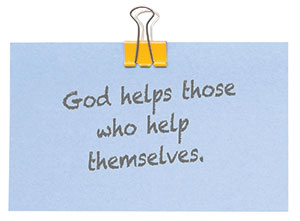
istock/RUSN
God helps those who help themselves
The character on a sitcom spouted this line as he helped himself to the last slice of pie. The canned laugh track prompted viewer laughter. It’s funny until someone takes that line to heart.
I’ve been in many conversations over the years in which I have gently disabused friends, family and church members alike that “God helps those who help themselves” is not in the Bible. One church member half-jokingly said, “Well, if it’s not in the Bible, then it should be.” This unscriptural adage has found its way into the religious imagination and skews our thinking about God.
It collapses into judgment of the worst sort because we tend to apply it to others when we believe them to be lazy or when we think they refuse to help themselves. It links God’s presence in our lives to our abilities that are finite, fragile and fleeting. While there is value and dignity in hard work, it doesn’t shield us from life. Life can be haphazard and quite random.
Frequently it eludes our every attempt to control it. Job loss, accidents, illness, natural disasters and other crises can change our life without a moment’s notice. Any one of these can immobilize us and render us helpless. In other words, there are times when we can’t resolve our challenges through our own efforts.
It’s during those times when the simplicity of lessons learned in confirmation rise to consciousness: “I cannot by my own reason or strength believe in Jesus Christ ….” We aren’t called to live by guts but by grace. God’s assistance and presence in our lives is independent of our feelings, thoughts or activity, all of which can be erratic and fickle. God’s loveis unwavering toward us.
– Angela L. Shannon
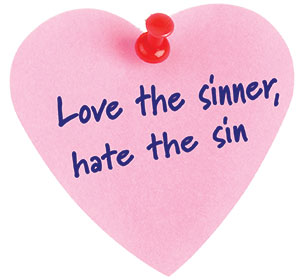
istock/BIITLI
Love the sinner, hate the sin
This popular adage is connected to the ideas of loving one’s neighbor as one’s self (part of Jesus’ greatest commandment), and to naming and rejecting sin.
Both pieces are important for disciples who follow Jesus. We are called to love God and neighbor and to strive against sin, that which we both do and leave undone.
As a stone lobbed into a conversation about something difficult or controversial, this adage often serves to end relationships more than to seek their transformation or renewal. To be sure, if sin is manifesting in the form of abuse, an entirely transformed relationship may be neither safe nor possible, and should be named.
As Lutherans, however, we understand sin to be part of our existence as human beings. This adage is generally used to say: I love you but hate something about you that I understand to be sinful. So I don’t have to deal with how this has changed our relationship. Or even entertain the possibility that my own sin is contributing to our situation.
In many cases, broken human relationships are the result of an interaction of sin and love that is complex. A hurtful action leads to a hurtful response; sin dances with sin and love is lost; relationships crumble. To love one’s neighbor as one’s self means being willing to engage with and strive against one’s own sin as readily as another’s.
Perhaps a revision is in order: God loves sinners. And forgives sins. Locating love and forgiveness in the hands of God invites us to approach one another with honesty and humility, praying and working for a relationship that will probably change everyone involved.
– Michael D. Fick



